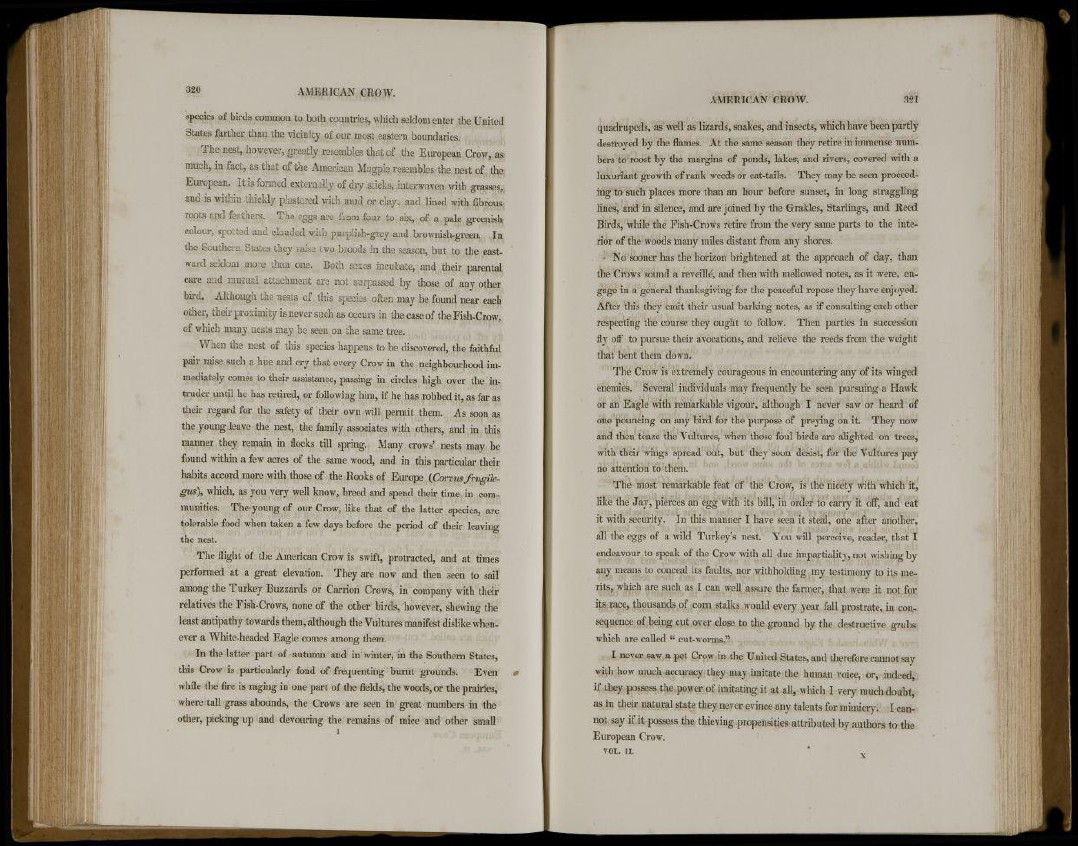
320 AMERICAN CROW.
species of birds common to both countries, which seldom enter the United
States farther than the vicinity of our most eastern boundaries.
The nest, however, greatly resembles that of the European Crow, as
much, in fact, as that of the American Magpie resembles the nest of the
European. It is formed externally of dry sticks, interwoven with grasses,
and is within thickly plastered with mud or clay, and lined with fibrous
roots and feathers. The eggs are from four to six, of a pale greenish
colour, spotted and clouded with purplish-grey and brownish-green. In
the Southern States they raise two broods in the season, but to the eastward
seldom more than one. Both sexes incubate, and their parental
care and mutual attachment are not surpassed by those of any other
bird. Although the nests of this species often may be found near each
other, their proximity is never such as occurs in the case of the Fish-Crow,
of which many nests may be seen on the same tree.
When the nest of this species happens to be discovered, the faithful
pair raise such a hue and cry that every Crow in the neighbourhood immediately
comes to their assistance, passing in circles high over the intruder
until he has retired, or following him, if he has robbed it, as far as
their regard for the safety of their own will permit them. As soon as
the young leave the nest, the family associates with others, and in this
manner they remain in flocks till spring. Many crows' nests may be
found within a few acres of the same wood, and in this particular their
habits accord more with those of the Rooks of Europe (CorvusfritgiUgus),
which, as you very well know, breed and spend their time in communities.
The-young of our Crow, like that of the latter species, are
tolerable food when taken a few days before the period of their leaving
the nest.
The flight of the American Crow is swift, protracted, and at times
performed at a great elevation. They are now and then seen to sail
among the Turkey Buzzards or Carrion Crows, in company with their
relatives the Fish-Crows, none of the other birds, however, shewing the
least antipathy towards them, although the Vultures manifest dislike whenever
a White-headed Eagle comes among them.
In the latter part of autumn and in winter, in the Southern States,
this Crow is particularly fond of frequenting burnt grounds. Even *
while the fire is raging in one part of the fields, the woods, or the prairies,
where tall grass abounds, the Crows are seen in great numbers in the
other, picking up and devouring the remains of mice and other small
l
AMERICAN CROW. 321
quadrupeds, as well as lizards, snakes, and insects, which have been partly
destroyed by the flames. At the same season they retire in immense numbers
to roost by the margins of ponds, lakes-, and rivers, covered with a
luxuriant growth of rank weeds or cat-tails. They may be seen proceeding
to such places more than an hour before sunset, in long straggling
lines, and in silence, and are joined by the Grakles, Starlings, and Reed
Birds, while the Fish-Crows retire from the very same parts to the interior
of the woods many miles distant from any shores.
- No sooner has the horizon brightened at the approach of day, than
the Crows sound a reveille, and then with mellowed notes, as it were, engage
in a general thanksgiving for the peaceful repose they have enjoyed.
After this they emit their usual barking notes, as if consulting each other
respecting the course they ought to follow. Then parties in succession
fly off to pursue their avocations, and relieve the reeds from the weight
that bent them down.
The Crow is extremely courageous in encountering any of its winged
enemies. Several individuals may frequently be seen pursuing a Hawk
or an Eagle with remarkable vigour, although I never saw or heard of
one pouncing on any bird for the purpose of preying on it. They now
and then teaze the Vultures, when those foul birds are alighted on trees,
with their wings spread out, but they soon desist, for the Vultures pay
no attention to them.
The most remarkable feat of the Crow, is the nicety with which it,
like the J ay, pierces an egg with its bill, in order to carry it off, and eat
it with security. In this manner I have seen it steal, one after another,
all the eggs of a wild Turkey's nest. You will perceive, reader, that I
endeavour to speak of the Crow with all due impartiality, not wishing by
any means to conceal its faults, nor withholding my testimony to its merits,
which are such as I can well assure the farmer, that were it not for
its race, thousands of corn stalks would every year fall prostrate, in consequence
of being cut over close to the ground by the destructive grubs
which are called " cut-worms.'"
I never saw a pet Crow in the United States, and therefore cannot say
with how much accuracy they may imitate the human voice, or, indeed,
if they possess the power of imitating it at all, which I very much doubt,
as in their natural state they never evince any talents for mimicry. I cannot
say if it possess the thieving propensities attributed by authors to the
European Crow.
VOL. II. v